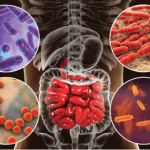 Antigens from the microbiota are constantly identified by the immune system, generating a pool of memory T cells and immunoglobulin G (IgG) memory B cells. These immune cells can then cross-react with antigens from the host, which can contribute to the pathogenesis of autoimmune disease. A study in Cell Host & Microbe looks at this interaction in patients with antiphospholipid syndrome (APS).1
Antigens from the microbiota are constantly identified by the immune system, generating a pool of memory T cells and immunoglobulin G (IgG) memory B cells. These immune cells can then cross-react with antigens from the host, which can contribute to the pathogenesis of autoimmune disease. A study in Cell Host & Microbe looks at this interaction in patients with antiphospholipid syndrome (APS).1
“APS is understudied and undertreated,” says Martin A. Kriegel, MD, PhD, senior author and adjunct professor of immunobiology at Yale School of Medicine, New Haven, Conn. “In APS, the role of the microbiome hasn’t been considered in depth. Given the sheer number of microbes we have, there are quite a few likely to stimulate both T and B cells, which are major drivers of autoimmunity.”
Roseburia Intestinalis Exhibits Protein Resembling APS Autoantigen
The researchers searched for a CD4+ Tv cell epitope and the major B cell epitope in the APS autoantigen β2-glycoprotein I (β2GPI) to bacterial proteins in non-redundant protein databases. Candidate sequences were used to identify human commensal gut bacteria with homology to both well-defined autoepitopes. They identified Roseburia intestinalis (R. intestinalis) as a common bacterium that expresses proteins that closely resemble these two epitopes.
Patients with APS who had evidence of immune recognition of R. intestinalis also demonstrated subclinical signs of intestinal inflammation. Human β2GPI-autoreactive lymphocytes and autoantibodies from APS patients cross-reacted with homologous areas expressed by R. intestinalis. Specifically, autoantigen-reactive CD4+ memory T cell clones and an APS-derived monoclonal antibody cross-reacted with epitopes from R. intestinalis.
Core-sequence-dependent anti-R. intestinalis IgG titers were significantly elevated in APS patients, and correlated with anti-β2GPI IgG autoantibodies. Additionally, the bacterium was identified as a chronic driver of β2GPI autoreactivity in a murine model, demonstrating T and B cell cross reactivity in vivo with progression in APS-prone mice.
Cross-Reactive Triggers: A Potential Risk Factor
“One of the interesting things coming out of our research is that a bug that is beneficial in disease A, can be really bad in disease B,” says Dr. Kriegel. “This [finding] is especially true in autoimmune diseases in which the immune system overshoots in different ways depending on the disease. In APS, based on these cross-reactive triggers in R. intestinalis, the presence of R. intestinalis can be a potential risk factor for autoimmune disease, but may have metabolic benefits for gut inflammation. The risk of one autoimmune disease may be related to different aspects of the same bacterium that mitigates another autoimmune disease.”
The hygiene hypothesis is the belief that exposure to infectious agents may help protect us from immune-related disorders, through antigenic competition, alterations in immunoregulation, and promotion of a Th1 vs. Th2 response. By decreasing our exposure to infections, antibiotics and improvements in hygiene may have increased our tendency to develop autoimmune diseases.
Mouse Model Gives Additional Information
Researchers also looked at a mouse model in which mice were exposed to R. intestinalis to induce β2GPI-specific lymphocytes and antibodies. As a control, they selected Bacteroides thetaiotaomicron (B. thetaiotaomicron). Lymphocytes from the spleen or peripheral lymph nodes of R. intestinalis mice proliferated more to recombinant human β2GPI than to B. thetaiotaomicron or sham-immunized mice.
They next immunized mice with a R. intestinalis lysate (with Freund’s adjuvant) over 48 days to allow for a full antibody response to develop. Mice immunized with R. intestinalis had higher titers of serum anti-β2GPI IgG antibodies compared with controls. IgG antibodies to R. intestinalis DNA methyltranserfase (DNMT), containing the major APS B cell epitope, were also markedly increased compared to B. thetaiotaomicron or sham controls.
To determine if gut colonization with R. intestinalis would affect a rodent model with a genetic predisposition to spontaneously developing APS, they chose the (NZW x BXSB) male F1 hybrid mouse, which can develop an early, lupus-like disease. Deaths in this strain usually occur by 30 weeks because of anti-β2GPI autoantibody production leading to coronary microthrombi and myocardial infarctions.
All mice were treated with vancomycin prior to introduction of R. intestinalis. This treatment was done to prevent F1 mice from developing antibodies against other organisms in the microbiome, as well as to open a colonic niche for the human bacterium.
After pretreatment, investigators exposed the mice to fresh cultures of R. intestinalis or a sterile growth medium as a control. Autoantibody titers in mice infected with R. int were markedly above the titers observed in mice exposed to growth medium alone. Human anti-β2GPI IgG was positively correlated to anti-R. intestinalis DNA methyltransferase IgG similar to that seen in APS patient sera.
The researchers also noted that R. intestinalis exposed mice showed extensive inflammation in both the myocardium and subendocardium. This finding, along with lymphocytic infiltrates and necrosis, was not seen in controls that survived beyond 30 weeks. Lymphocytic infiltrates were also found in the lungs of the exposed mice, but not controls.
Genome & Microbiome Intertwined
“In some ways, the microbiome is not that much different from the host genome,” says Dr. Kriegel. “There are genetic risk factors in which we know a patient is predisposed to developing a given disease. It also appears there are some elements of the microbiome that make a person more susceptible to a disease, such as APS.”
Dr. Kriegel thinks there is a need to look at both the human genome and microbiome. He says research should begin to identify a subset of individuals who have both genetic risk factors and autoimmunity-inducing bacteria.
“You really can’t easily change the genome, but you can consider a therapy that removes triggers in the microbiome,” he says. “Although no one has started to look closely at R. intestinalis, I think the microbiome adds to the triggers in autoimmunity, suggesting this [field] is a worthwhile area to work on translating to viable therapies.”
Study ‘Thorough & Robust’
Jessy Alexander, PhD, research professor at Department of Medicine, Jacobs School of Medicine & Biomedical Sciences, University at Buffalo, N.Y., says this research is a thorough and robust study addressing a novel aspect of the gut microbiome.
“The authors have carried out a detailed study using APS as their focus,” she says. “The unique feature is that they show a microbe that normally inhabits the human gut. R. intestinalis, can generate an immune response and trigger an autoimmune condition.”
β2GPI protein is important in clotting, and antibodies to this protein are present in APS patients. This work revealed a possible mechanism showing that R. intestinalis, closely mimics a cryptic antigen sequence of the β2GPI protein exposed after it is unfolded. When inhibited, the results include fetal loss and thromboembolism.
“Because this is a microbe normally present in the gut, clinicians may not give due importance as one of the possible culprits in APS,” says Dr. Alexander. “The microbial balance and homeostasis are important and should be followed with due diligence in APS and other autoimmune diseases.”
Kurt Ullman is a freelance writer based in Indiana.
Reference
- Ruff WE, Dehner C, Kim WJ, et al. Pathogenic autoreactive T and B cells cross-react with mimotopes expressed by a common human gut commensal to trigger autoimmunity. Cell Host Microbe. 2019 Jul 10;26(1):100–113.e8. Epub 2019 Jun 18.



